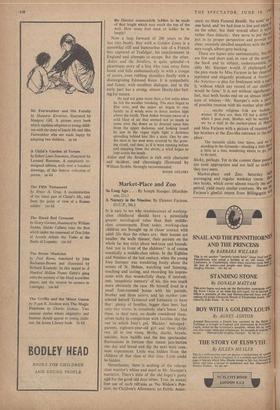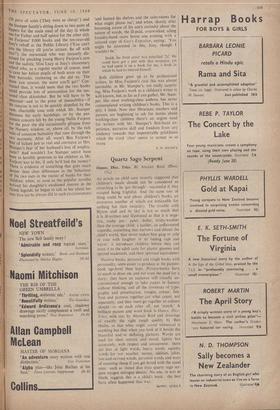Market-Place and Zoo
So Long Ago . By Joseph Stamper. (Hutchin- son, 21s.) A Nursery in the Nineties. By Eleanor Farjeon. (O.U.P., 30s.)
IT is easy to see why reminiscences of working- class childhood should have a potentially greater sociological value than their middle- class counterparts. Even today, working-class children are brought up in closer contact with adult life than the others are: their houses are smaller, the walls thinner, their parents on the whole far less strict about bed-time and bounds. And 'not in front of the children!.' is of course essentially a middle-class taboo. In the Eighties and Nineties of the last century, when the young Joey Stamper was wandering freely about the streets of St. Helens, watching and listening, touching and tasting, and recording his impres- sions with that wonderfully sharp, if intermit- tent, `snapshotic memory' of his, this was much more obviously the case. He himself lived in a small four-roomed house with his parents, brother and three sisters, and his mother con- sidered herself 'favoured and fortunate to have that : plenty of families, bigger than hers, had only two rooms in somebody else's home.' And these, in their turn, no doubt considered them- selves lucky in comparison with families like the one to which Joey's pal, 'Bladder.' belonged: parents, eighteen-year-old girl and three child- ren, all in one room. Births, deaths, brawls, suicides, bum bailiffs and the less spectacular fluctuations in fortune that meant jam-butties one day and bread and dip the next were com- mon experiences. Little was hidden from the children of that class at that time. Little could be hidden.
Nevertheless, there is nothing of the veteran class warrior's whine and snarl in Mr. Stamper's, narrative. There's little of the old fogey's gusty sigh for the good old days either. True, he makes free use of such refrains as 'No Widow's Pen- sion; no Children's Allowance; no Public Assist-
ance; no State Funeral Benefit. No nowt' on ill!. one hand, and 'we had time to live and enjoY!' on the other, but their overall effect is sty1' rather than didactic: they serve to put the ject in its proper perspective and provide we. clear, minutely detailed snapshots with the ne';'''
sary rough, album-grey backing.
There are lapses into sentimentality, but tit are few and short and, in view of the nature the book and its subject, understandable. P`, sibly Mr. Stamper would, if challenged. CC: the plea made by Miss Farjeon in her deser■ep', reprinted and elegantly produced A Nurser)', the Nineties—a plea for Sentiment with a caPlicj S. 'without which any record of our child would be false.' It is not without significaneei feel, that both books end on an almost identicif note of whimsy—Mr. Stainper's with a P.letli of possible reunion with his mother after deal',
. . . maybe religious folk are backing,,, winner. If they are, then I'll bet a dollar I" when I pass over, Mother will be waiting ,01'
me by a stall in the market-place of 1-leav"" and Miss Farjeon with a picture of reunion her brothers at the Zoo-like entrance to the s311 place: The turnstile clicks four times, and We l standing in the Grounds--standing a little dalf,1 a little at a loss, wondering where to go. to do next. Sticky, perhaps. Yet in the context these passaV!, are most appropriate and not half so sicklY they may seem. Market-place and Zoo; Saturday tlig,,h1 scavenging and regular weekday treats: the' two books, which cover almost exactly the sail period, yield many similar contrasts. We see Farjeon's gleeful return from Billingsgate vot 120 pairs of soles ('They were so cheap!') and the Stamper family's sitting down to two pairs of kippers for the main meal of the day (a whole °he for Father and half apiece for the other six); the Farjeons' 8,000 books and the ten-year-old Joey's rebuff at the Public Library ("You can't imn the library till you're sixteen. Be off with You!'); the nursemaid who was instantly dis- missed for pinching young Harry Farjeon's arm and the sadistic Miss Lucy at Joey's elementary school who, as a regular matter of course, used to cane her Infant pupils of both sexes on their are buttocks, muttering as she did so, The More you scream, the more you'll get!' Con- trasted thus, it would seem that the two books could provide lots of ammunition for the sea- soned class skirmisher. But he will have to be his to the point of insensibility—if 'Its rancour is not to be quickly dispelled by the sane, charitable tone with which Mr. Stamper discusses his early hardships, or by the pas- sionate concern felt by the young Nellie Farjeon for the poor she did occasionally glimpse from the Nursery window, or, above all, by the rich vein of common humanity that runs through the two accounts. After all, wasn't Ben Farjeon's fear of failure just as real and corrosive as Mrs. Stamper's fear of her husband's loss of employ- ment? And wouldn't Joe. Stamper senior have been as lavishly generous to his children as Mr. Farjeon was to his, if only he'd had the money? There is evidence of something that goes much deeper than class differences in the behaviour of the two men in the matter of books for their children; when, as soon as the popular novelist noticed his daughter's awakened interest in the Greek legends, he began to talk to her about her new love (as he always did in such circumstances)
'and hunted his shelves and the sales-rooms for what might please me'; and when, shortly after becoming aware of his son's curiosity about the nature of words, the ill-paid, overworked, ailing foundry-hand came home one evening with a tattered copy of Guy's Expositor, saying: 'You might be interested in this, Joey, though I wouldn't be.'
Inside the front cover was pencilled '2d.' He could have got a pint with that twopence, yet he had spent it on a book for me, a book in which he had no interest himself.
Both children grew up to be professional writers. In Miss Farjeon's case this was almost inevitable; in Mr. Stamper's, not really surpris- ing. Miss Farjeon's work as a children's writer is well known, but, as far as I can gather, Mr. Stam- per, like most working-class authors, has never contemplated writing children's books. This is a pity, 1 think. Now that librarians, teachers and parents are beginning to ask for stories about working-class children there's an urgent need for writers with Mr. Stamper's first-hand ex- perience, narrative skill and freedom from any tendency towards that impenetrable prickliness which the word 'class' seems to arouse in so many.
E. W. IIILDICK











































 Previous page
Previous page